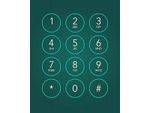Difference between revisions of "Mathematics fun corner"
| Line 2: | Line 2: | ||
| − | = | + | =Phone_number_birthday_puzzle Phone number birthday puzzle= |
{|class="wikitable" | {|class="wikitable" | ||
|- | |- | ||
| Line 18: | Line 18: | ||
Now you see a three-digit number. The first digit is the last digit of your phone number, the next two digits are your actual age! You can use the attached [http://karnatakaeducation.org.in/KOER/en/images/1/17/Phone_number_birthday_puzzle.ods spreadsheet] to solve this and find out why it works!! | Now you see a three-digit number. The first digit is the last digit of your phone number, the next two digits are your actual age! You can use the attached [http://karnatakaeducation.org.in/KOER/en/images/1/17/Phone_number_birthday_puzzle.ods spreadsheet] to solve this and find out why it works!! | ||
| − | |||
| − | |||
| − | |||
=Maths Quizzes= | =Maths Quizzes= | ||
Revision as of 00:17, 28 July 2015
Phone_number_birthday_puzzle Phone number birthday puzzle

|
YOUR PHONE NUMBER WILL REVEAL YOUR AGE |
Your Phone number will reveal your actual Age. It will take about 15 seconds,read and do it at the same time so that you will not lose the fun.
- Take a look at your last digit of your cell phone number
- Use this figure and multiply by 2
- Then add 5
- And then multiply by 50
- And then add the number 1765
- The last step; with this number, subtract your birth year.
Now you see a three-digit number. The first digit is the last digit of your phone number, the next two digits are your actual age! You can use the attached spreadsheet to solve this and find out why it works!!
Maths Quizzes
| Lower Primary/ Higher Primary Level
|
Higher Primary / High School
|
| High School/ PU level
|
High School/ PU level - Hands on
|
The origin of the calendar
In the Roman Julian Calendar, April used to be the first month of the year; but the Gregorian Calendar observed January as the first month. Even after shifting to the Gregorian Calendar, many people refused to give up old traditions and continued celebrating 1st April as the New Year's Day. When simple orders didn't work, the King finally issued a royal dictum; which stated that those who celebrated 1st April as the new year's day would be labelled as fools. From then on, 1st April became April Fool's Day.
A Julian year was 11 days longer than a Gregorian year. So, the King of England ordered 11 days to be wiped off the face of that particular month.
So, the workers worked for 11 days less that month, but got paid for the whole month. That's how the concept of "paid leave" was born. Hail the King!!!
Magic Square

Arrange the cards such that each card is the difference between the
two cards immediately below it.